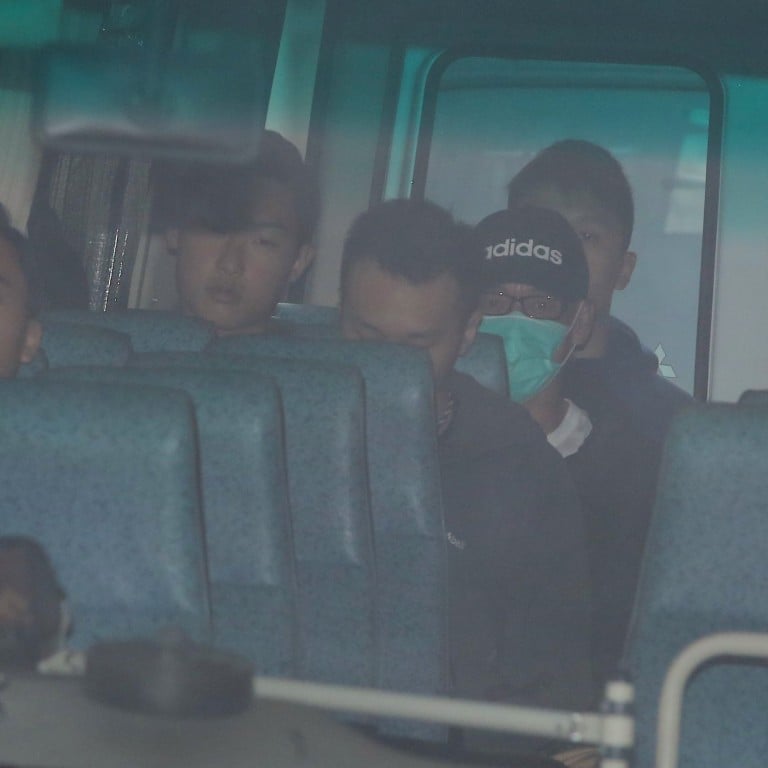
Notorious Hong Kong gangster Kwai Ping-hung released from prison ahead of deportation to US
- The release of Kwai, once among the city’s most wanted, has prompted law-enforcement officers to be on high alert
- The 59-year-old was taken straight to the airport, for deportation to the US
One of Hong Kong’s most notorious gangsters was released from prison on Saturday morning under heavy security after 16 years behind bars, and taken to the airport ahead of his deportation to the United States.
Kwai Ping-hung, the “King of Thieves”, had prompted law-enforcement officers to be on high alert, having been labelled “an extremely dangerous gangster” by police.
At about 5.45am, Stanley Prison – the maximum-security facility where the 59-year-old US passport holder has been jailed since 2005 – was guarded by about 30 officers, who had arrived in three batches of motorcycles and vans.
Two hours later, Kwai sat motionless wearing glasses, a mask, and an Adidas sports cap in the back seat of a 28-person white van provided by the Immigration Department, as he was taken to the airport with traffic police clearing the way at the front of the motorcade.

Kwai was accompanied in the van by eight plain-clothes officers.
The motorcade sped through the affluent neighbourhood of Stanley via Repulse Bay Road, with officers on motorbikes holding back traffic in the Cheung Tsing Tunnel and on the Tsing Ma Bridge, both major thoroughfares to the city’s airport, to ensure clear passage for the now ex-prisoner.
Shortly after 8.30am, Kwai arrived at Gatehouse 1 of the airport, and did not go through the passenger terminal. The gatehouse is a checkpoint to process vehicles and people going into the airport’s restricted area, with a number of police standing guard outside.
Officers were seen taking a wheelchair to Kwai’s van, but the reason for that was unclear.

He boarded a United Airlines flight that departed Hong Kong at 11.21am, and was scheduled to land in New York at 1.25pm on Saturday, local time. It was understood Hong Kong law enforcers accompanied him on the plane.
Whether Kwai would walk free on US soil remained uncertain. It was possible officers would take him away once the aircraft landed if he was still wanted for crimes he is alleged to have committed in the 1990s.
US Customs and Border Protection have been contacted for comment.
‘King of Thieves’ Kwai Ping-hung spends final night behind bars
During court trials in Hong Kong, it was heard that Kwai got married in the US in 1995 and emigrated there a year later. But he divorced his wife in 2000. He has two children.
A senior government source told the Post earlier that, as Kwai was not a Hong Kong resident but a US passport holder, the city had to deport him.

When Kwai was snared on Christmas Eve 2003, the officers from the Special Duties Unit (SDU) made the biggest seizure of firearms in nearly 30 years. They found a wide range of weapons, including shotguns, self-loading pistols, almost 900 rounds of ammunition and seven grenades.
Not a single shot was fired during the three-hour raid, as Kwai was literally caught napping. The arrest was described as “the best Christmas gift to Hongkongers” and brought an end to an era when larger-than-life criminals armed with AK-47s turned city streets into shooting galleries.
For multiple convictions, Kwai was handed a total jail term of 24 years in 2005. Another government source said Kwai had received a one-third reduction for good behaviour, meaning he would serve 16 years.
Notorious gangster Kwai Ping-hung to be released from jail this week
The insider added that Kwai mainly helped bind books while in prison and had got along with inmates quite well in recent years.
During the 1980s and 1990s, Hong Kong was gripped by a crime wave during which police battled heavily armed criminals on the streets of its busiest neighbourhoods, as many crime bosses from Guangdong province sneaked into the city to carry out high-profile robberies of jewellery shops. It prompted the force to expand its structure and strengthen its arms.

Kwai came to Hong Kong illegally from mainland China in 1980 and was suspected of committing 20 armed robberies in three decades, as well as shooting and wounding two policemen in Mong Kok in 2001.
Organised crime and triad bureau head Andy Tsang Wai-hung – who would later become police chief – posted a record HK$2 million reward for the capture of Kwai and had Interpol issue a red notice, asking law-enforcement officers worldwide to help find the wanted criminal.
Kwai was dubbed the new “King of Thieves” after notorious criminal Yip Kai-foon and “Big Spender” Cheung Tze-keung.

Cheung, who masterminded the abduction of Walter Kwok Ping-sheung and Victor Li Tzar-kuoi – son of Li Ka-shing – in the 1990s, was executed by shooting in Guangzhou in 1998, aged 43. He had acquired more than HK$1 billion in ransom money.
The lives of the trio inspired the movie Trivisa, which won the Best Film award at the 36th Hong Kong Film Awards in 2017. Former deputy commander of the SDU Frank Kwok Yam-yung, who led the raid against Kwai in 2003, became the police force’s operations chief after a management reshuffle last October — a position to strengthen the handling of the city’s ongoing protest crisis.

